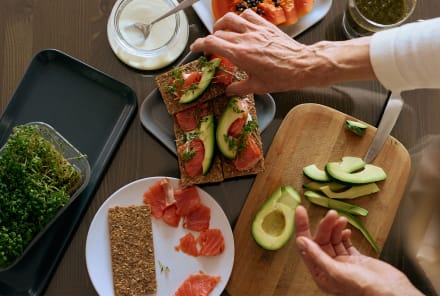Advertisement
Transforming Your Health Starts With Your Mind—Here Are 3 Easy Ways To Start


The range of advice on diet and exercise is overwhelming. While it makes sense to try to keep up with the latest information and to try things that are well supported by research, much dieting advice, in particular, is not established by science. So much advice is also contradictory. Fat is awful; no, it depends. Sugar is terrible, but wait, artificial sweeteners are poison.
Choose rational things you'd like to try and experiment with them. Remember: variation, selection, retention. Keep only what you find helpful. What works for others may not be good for you. For example, lots of programs tell you to eat a big breakfast. But I like a very light and very late breakfast of a few walnuts and an apple. I settled on that because I can sense in my body that for me light is better, and even that walnuts are better than, say, pecans. I call it body knowledge.
I've been watching and tweaking these patterns for years (other examples from my own body knowledge are cutting down on flour or decreasing the total time window for eating to under eight hours), and I'm not usually surprised to read studies that back up what I've seen with my own body. But a few months ago, I was startled to see a large new study that actually tested (wait for it) walnuts! Apparently, my body is not the only one reacting this way!
You might be different. Don't follow my pattern: Watch the science and try things out. Pay attention to your body, and let it educate you. You are evolving your life as you choose.
Make friends with your cravings.
The next time you feel a craving come on, try this. Instead of fighting it, take a step back and notice it for what it is. You might even label it "craving." Don't fight it. Just look at it. Then ask yourself the following questions:
- If your craving had a shape, what would it be?
- If it had a color, what would it be?
- If it had a size, how big or small would it be?
- Does it seem solid, like an object, or does it shimmer, flutter, shake, or move?
- Where does it live in your body? Do you experience it in your head? Your belly? Somewhere else?
- Are there any emotions that are connected to this craving? Do you feel anxious, stressed out, sad, angry, or something else?
Now, imagine you can reach out and touch your craving. At first, you might give it a sympathetic pat on the back, so to speak. See if eventually you can actually embrace the craving, figuratively cradling it in your arms like you would a child. Feel empathy for it, noticing how much it wants, how hungry it is for attention.
You can do all of this without acting on the craving. In fact, you can take this craving with you while you engage in any action of your choosing. In time, the craving may fade. But if it doesn't, you can carry it as long as it needs. It's not you—it's a part of you.
Build in tiny amounts of exercise everywhere you go.
The demand for quick, big success has produced more failure than any other verbal rule. In the area of exercise, small and now will beat big and then any day. Pick small exercises you can do during the day and link them to your regular activities. Then build small habits of doing them. If your mind complains that these exercises are too small to matter, agree enthusiastically and go right on doing them.
Here are some ways to begin:
- While in line anywhere, slowly do toe raises.
- Always take the stairs if you have time and it is safe. Always.
- When grocery shopping, grab a gallon of milk in a plastic jug with a handle and, while you shop, slowly do curls or triceps presses to the point of muscle exhaustion (a count of eight up and four down is about right—yes, there has actually been research on this!). If you ever see me in an airport, chances are you will see me doing this with my briefcase. People will look at you funny, but do you care?
- While waiting for your coffee to brew in the morning, do squats.
- Do pushups every other night before going to bed, having the goal of doing as many as your years on the planet (yes, I can do 70 of them).
Get a shame buddy and push your own buttons.
If your diffusion skills allow you to use advanced social diffusion methods, exercise together with friends who are willing to put common shame statements out there for all to see. Do this only if you have a gut sense that you are truly ready for this practice. Say you have a friend who is also trying to lose weight and is willing to do vigorous walks with you. Both of you are ashamed of the way your bodies jiggle as you walk. Get T-shirts made with statements like My Body Jiggles. So Sue Me! and wear them together during your exercise program.
Timed well, this can be extremely liberating, even fun! Think of it as a mental Declaration of Independence, as if you are underlining that it's OK to be you, really.
Excerpted from A Liberated Mind: How To Pivot Toward What Matters by arrangement with Avery, an imprint of Penguin Publishing Group, a division of Penguin Random House LLC. Copyright © 2019, Steven C. Hayes, Ph.D.
Watch Next
Enjoy some of our favorite clips from classes
Enjoy some of our favorite clips from classes
What Is Meditation?
Mindfulness/Spirituality | Light Watkins
Box Breathing
Mindfulness/Spirituality | Gwen Dittmar
What Breathwork Can Address
Mindfulness/Spirituality | Gwen Dittmar
The 8 Limbs of Yoga - What is Asana?
Yoga | Caley Alyssa
Two Standing Postures to Open Up Tight Hips
Yoga | Caley Alyssa
How Plants Can Optimize Athletic Performance
Nutrition | Rich Roll
What to Eat Before a Workout
Nutrition | Rich Roll
How Ayurveda Helps Us Navigate Modern Life
Nutrition | Sahara Rose
Messages About Love & Relationships
Love & Relationships | Esther Perel
Love Languages
Love & Relationships | Esther Perel

















